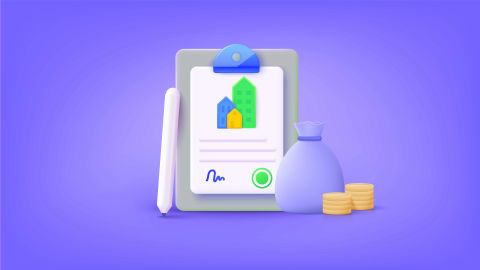Property tax is a common responsibility for homeowners in India, though its terminology can sometimes be confusing due to differing rules across states and municipalities. In simple terms, property tax meaning refers to the levy paid to the local government or municipal authority for owning property within its jurisdiction. If you want to clearly understand how property tax works and its finer details, you’ve come to the right place.
What is property tax?
Property tax, often referred to as house tax, is a levy imposed on property owners by local municipal authorities such as a panchayat, municipality, or municipal corporation. The revenue collected is used to maintain and improve civic amenities in the area, including roads, drainage systems, street lighting, parks, and other public infrastructure.
This tax is generally charged on real estate assets such as residential and commercial buildings, along with the land attached to them and any improvements made. Vacant land without any constructed structure is typically not subject to property tax.
How to calculate property tax?
Property tax is calculated using different valuation systems adopted by municipal authorities across India. The method varies depending on the city and local regulations.
Unit Area Value System
Under the Unit Area Value System, property tax is calculated based on the per unit price of the built-up area. The tax rate per square foot is determined according to factors such as location, usage, and prevailing market value of the property. Several municipalities follow this method, including cities like Kolkata, Patna, and Bengaluru.
Rateable Value System
The Rateable Value System calculates property tax based on the annual rental value of the property. Municipal authorities assess the expected rent by considering factors such as size, location, condition, and available amenities. This system is commonly followed in cities such as Hyderabad and Chennai.
Capital Value System
Under the Capital Value System, property tax is based on the total market value of the property. The applicable rate is determined by the municipal authority and may be revised periodically. This system is prevalent in major metropolitan cities such as Mumbai.
Property tax calculation:
Property Tax = Base value x Type of building x Age factor x Floor factor x Category of use x Built-up area
Different corporations employ various methods to calculate property tax, but the overall approach to these calculations is generally consistent.
How to calculate house tax?
House tax, also known as property tax, is calculated based on factors like property type, location, built-up area, age of the property, and usage (residential or commercial). Municipal corporations or local bodies apply a standard formula, which usually includes:
House Tax = Base Value × Built-up Area × Age Factor × Usage Category × Floor Factor
For instance, larger or commercial properties attract higher tax compared to smaller residential units. Since rates differ across states and municipalities, homeowners should check their respective civic body’s online property tax calculator for accurate tax estimation.
Method |
How Tax Is Calculated |
Cities Where Followed |
Capital Value System (CVS) |
Calculated as a percentage of the property’s market value |
Mumbai |
Unit Area Value System (UAS) |
Based on a fixed price per unit area of built up property |
Delhi, Kolkata, Bengaluru |
Rateable Value System (RVS) |
Determined on the basis of the property’s annual rental value |
Chennai, Hyderabad |
Required documents for paying property tax in India
Here are the required documents for paying property tax in India:
1. Property tax bill:
The most essential document is the property tax bill, which details the amount due and other relevant property information, including the property ID.
2. Property ownership proof:
A document proving ownership, such as the title deed, sale deed, or any legal document confirming your ownership of the property, is required.
3. Property ID/ assessment number:
This unique identification number assigned to your property by the municipal authority is needed for accurate processing of your property tax.
4. Identity proof:
A government-issued identity proof, such as Aadhaar card, PAN card, voter ID, or passport, may be necessary to authenticate the property owner's identity.
5. Address proof:
A recent address proof, such as utility bills (electricity or water bill) or a rental agreement (for tenants), may be required in some cases.
6. No Objection Certificate (NOC):
If the property is under a joint ownership agreement, a NOC from co-owners may be needed, especially in cases where tax payment is being made by one individual.
7. Encumbrance certificate:
In certain cases, particularly for properties with a mortgage or loan, an encumbrance certificate may be needed to show the property is free of legal liabilities.
8. Bank details:
If paying online or through a bank, you may need to provide your bank account details for payment processing or refund purposes.
How to pay property tax online?
Paying property tax online is a convenient and time-saving process. Most municipal authorities offer digital payment facilities through their official websites, allowing residents to complete payments securely from home.
Step 1: Visit your municipality’s official website
There is no universal portal for property tax payments. Each municipality has its own website. Visit the official site of your local municipal authority to begin the process.
Step 2: Select the property tax option
On the homepage, choose the ‘Property Tax’ option. You’ll be asked to specify the property type - Residential or Commercial. Ensure accurate selection to avoid errors.
Step 3: Enter property details
Provide your Property Tax Number, Revenue Survey Number, or Khatha Number (available on your property tax bill). Next, select the relevant assessment year for payment.
Step 4: Verify information
A form with property details like the owner’s name, area, and usage type will appear. Confirm the details and check the outstanding tax amount displayed against your bill.
Step 5: Make payment
Choose a preferred payment method such as Internet Banking, Debit, or Credit Card. Complete the transaction via the secure payment gateway.
Step 6: Download receipt
On successful payment, a challan/receipt is generated. Save or print it for future reference. Your property tax payment is now complete.
Types of property tax
Here are the types of property tax:
- Real Property Tax (RPT): This tax is imposed on land and buildings. It is usually calculated based on the value of the property.
- Personal property tax: This tax applies to movable property like machinery, equipment, and vehicles owned by businesses or individuals.
- Transfer tax: Imposed on the transfer of property ownership, such as during a sale or inheritance.
- Estate tax: Charged on the value of a deceased person’s estate, which includes their property and assets.
- Land value tax: Focuses on taxing the land itself, not the buildings or improvements on it.
- Special assessments: These are taxes for specific improvements or services like roads, sewer systems, or street lighting in a particular area.
What is the purpose of property tax in India
Property tax in India serves several important purposes, and it is a significant source of revenue for local municipal bodies. The key purposes of property tax in India include:
Local government revenue:
Property tax is a primary source of revenue for local municipal bodies or urban local bodies. The funds generated through property tax contribute to the development and maintenance of civic amenities and infrastructure in the local area.
Infrastructure development:
The revenue generated from property tax is utilized for various infrastructure development projects within the local jurisdiction. This includes the construction and maintenance of roads, drainage systems, parks, and other public amenities.
Public services and utilities:
Property tax funds are used to provide essential public services and utilities such as water supply, sanitation, street lighting, and waste management. These services contribute to the overall well-being and quality of life in the local community.
Urban planning and development:
Property tax plays a crucial role in urban planning and development. The funds collected are often used to implement planned development projects, regulate land use, and enhance the overall urban environment.
Maintenance of common areas:
Property tax revenue is utilised for the maintenance and upkeep of common areas, including public parks, playgrounds, and community facilities. This ensures that residents have access to well-maintained recreational spaces.
Municipal governance:
Property tax is an essential component of the fiscal autonomy of local municipal bodies. It allows them to have financial independence and govern efficiently by catering to the specific needs and priorities of the local community.
Equitable distribution of burden:
Property tax is based on the principle of wealth or property ownership. It ensures that individuals who own properties contribute to the local government funds based on the value and type of property they possess. This helps in achieving a more equitable distribution of the tax burden.
Encouragement of proper land use:
Property tax rates may be structured to encourage proper land use and discourage the hoarding of vacant land. This can promote efficient use of urban spaces and discourage property owners from keeping valuable land unused.
Revenue for local services:
Property tax revenues are directly allocated for local services, and the collection is often earmarked for specific purposes such as education, healthcare, and social welfare within the local payments from residents.
On what types of property tax is deducted
Property tax is collected on all tangible real estate properties, which include the following:
Residential and commercial buildings
Attached lands
Rented houses
Flats
However, this municipal tax is not levied on vacant plots that have no adjoining buildings as it is only applicable to constructed buildings.
Interest on property tax
Late property tax payments may incur a fine, typically calculated as a percentage of the outstanding amount. The interest rate varies across states, with some waiving it entirely, while others impose rates ranging from 5% to 20%, depending on local policies - similar to how loan against property interest rates differ based on lender terms and regional regulations.
For example, certain states have waived penalties on property tax, whereas Bangalore reduced the interest rate for late payments from 20% to 10% in an effort to encourage timely payments from residents. Such reductions can positively impact overall property-related expenses, which are often evaluated alongside tools like a loan against property EMI calculator when planning long-term financial commitments.
Some popular property taxes in India
Frequently asked questions
Property tax, also known as real estate or house tax, is a local government tax imposed on the ownership of real property, including land and buildings. It serves as a crucial source of revenue for local municipalities, funding public services and infrastructure.
The rates and regulations vary by state and city, as property tax is determined by local authorities. Property tax is assessed based on factors like annual rental value or capital value. Property owners must pay this tax to fund local services and infrastructure.
Property tax is important in India for various reasons. It serves as a significant source of revenue for local governing bodies, funding essential services and infrastructure. It follows a decentralised governance model, allowing local authorities to set tax rates and allocate revenue based on community needs.
Follow the below steps to pay the property tax in Delhi:
- Ensure property assessment is accurate
- Check the tax amount based on property details
- Choose payment mode: online or offline
- Make the payment
- Visit the MCD website
- Enter property details and verify the tax amount
- Choose an online payment method
- Complete the transaction and save the payment receipt for reference
The property tax rate in India varies across states and municipalities. On average, it can range from 5% to 20% of the property's annual rental value or the property's market value. Specific rates are determined by local authorities, and property owners should check with their municipal corporation or local government for the applicable rates in their area.
In India, property tax is typically paid by the property owner. The individual or entity that owns the property, whether residential or commercial, is responsible for paying the property tax to the local municipal authority or governing body.
The timing for property tax payment in India varies among municipalities, but it is commonly due annually. Property tax payments are often expected during the first quarter of the financial year, with deadlines typically falling between April and June. Property owners should check with their local municipal authorities for specific deadlines and procedures in their area.
Yes, many municipalities in India offer rebates on property tax for prompt and early payments. The rebate percentage and conditions vary by local authorities, and property owners should check with their municipal corporation for specific details.
In India, agricultural land is generally exempt from property tax. However, property tax regulations may vary among states and municipalities, and exemptions can depend on factors such as land use and local government policies.








